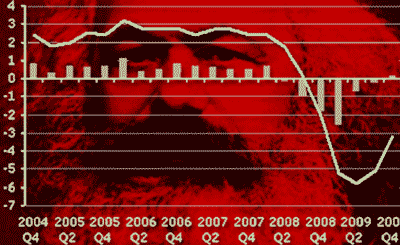Archivo
«La ley de la baja tendencial de la tasa de ganancia»: Reinaldo Carcanholo
 I. Introducción
I. Introducción
Una de las consecuencias inevitables de la teoría del valor, cuando se interpreta correctamente, es la llamada ley de la baja tendencial de la tasa de ganancia.
En la época de Marx, muchos autores del campo económico consideraban como indiscutible que la expansión capitalista llevaba necesariamente a una reducción progresiva de la tasa general de ganancia del capital. Es el caso, por ejemplo, de Adam Smith y de Ricardo. El primero la explicaba de una manera un tanto ingenua, al atribuirla al crecimiento de la competencia entre los numerosos capitales que surgían con la expansión capitalista, mientras que Ricardo tenía una explicación más sofisticada. Explicaba la caída de la tasa de ganancia apoyándose en el inevitable crecimiento de la renta de la tierra, atribuyendo, por tanto, las dificultades del sistema a los terratenientes. Esta teoría favorecía directamente su posición política de defensa de la burguesía y de enfrentamiento con los señores de la tierra.
«The Unmaking of Marx’s Capital. Heinrich’s Attempt to Eliminate Marx’s Crisis Theory»: Andrew Kliman, Alan Freeman , Nick Potts, Alexey Gusev and Brendan Cooney
 Abstract
Abstract
Michael Heinrich’s recent Monthly Review article claims that the law of the tendential fall in the rate of profit (LTFRP) was not proved by Marx and cannot be proved. Heinrich also argues that Marx had doubts about the law and that, for this and other other reasons, his theory of capitalist economic crisis was only provisional and more or less in continual flux.
This response shows that Heinrich’s elementary misunderstanding of the law––his belief that it is
meant to predict what must inevitably happen rather than to explain what does happen––is the
source of his charge that it is unproved. It then shows that a simple misreading of Marx’s text
lies at the basis of Heinrich’s claim that the simplest version of the LTFRP, “the law as such,” is
a failure. Marx’s argument that increases in the rate of surplus-value cannot “cancel” the fall in
the rate of profit is then defended against Heinrich’s attempt to refute it. Finally, the paper
presents evidence that Marx was indeed convinced that the LTFRP is correct and that he
regarded the crisis theory of volume 3 of Capital as finished in a theoretical sense.
«La crisis económica mundial y la acumulación del capital, las finanzas y la distribución del ingreso. Debates en la economía marxista»: Juan Pablo Mateo Tomé
RESUMEN
Este artículo examina algunos ejes de los debates entre autores marxistas sobre la crisis económica mundial que se inició en 2007. En concreto, se examinan las distintas caracterizaciones de la crisis, el papel de la tasa de ganancia y las diversas causas de su descenso, junto a las explicaciones de la crisis a partir de las finanzas, el neoliberalismo y la distribución del ingreso. Se constata la variedad de explicaciones, la distancia entre Marx y sus seguidores, así como los ámbitos de discusión que abre la actual crisis para un enfoque en el que la crisis es un momento necesario del proceso de acumulación.
Palabras clave: crisis económica, Marx, tasa de ganancia, finanzas, acumulación
INTRODUCCIÓN
En este texto se analizan las principales controversias que la actual crisis económica mundial ha suscitado entre los autores marxistas. Algunos estudios han abordado esta revisión temática desde diferentes perspectivas (Choonara 2009, Carchedi 2009, Tapia 2009, Katz 2010, Roberts 2010, Duménil y Levy 2011a, 2012, Cámara, 2012 y Basu y Vasudevan 2013), pero aquí pretendemos ofrecer una revisión más amplia a partir de una serie de ejes temáticos que incluirán tanto caracterizaciones generales de la crisis como discusiones parciales. El objetivo radica, pues, en exponer diversos análisis de la crisis actual realizados por autores de diversas corrientes del enfoque marxista, pero no limitándose a una simple enumeración de diagnósticos, sino reflexionando a partir de nuestra interpretación de la teoría marxista de la crisis. De esta forma se podrán extraer los debates fundamentales que la Gran Recesión ha generado en este ámbito del pensamiento.
«Michael Heinrich, Marx’s law and crisis theory»: Michael Roberts
 Michael Heinrich is an exponent of what is known as the ‘New German Reading of Marx’, which interprets the theory of value that Marx presents in Capital as a socially specific theory of ‘impersonal social domination’. He is a collaborator on the MEGA edition of Marx and Engel’s complete works and has published several philological studies of Capital. He has also authored a work on Marx’s theory of value, The Science of Value, which is forthcoming in the Historical Materialism book series. And recently he has published An Introduction to all Three Volumes of Capital as his first full-length work to appear in English.
Michael Heinrich is an exponent of what is known as the ‘New German Reading of Marx’, which interprets the theory of value that Marx presents in Capital as a socially specific theory of ‘impersonal social domination’. He is a collaborator on the MEGA edition of Marx and Engel’s complete works and has published several philological studies of Capital. He has also authored a work on Marx’s theory of value, The Science of Value, which is forthcoming in the Historical Materialism book series. And recently he has published An Introduction to all Three Volumes of Capital as his first full-length work to appear in English.
I am not going to do a critique of Heinrich’s views on the theory of value, as this has been done by Guglielmo Carchedi in his book, Behind the Crisis (see chapter 2). But I am moved to respond to a recent article of Heinrich’s in the American Monthly Review, entitled Crisis theory, the law of the tendency of the rate of profit to fall and Marx’s studies in the 1870s (monthlyreview.org).
In this article, Heinrich makes the following points: 1) Marx’s law is inconsistent because its categories are indeterminate; 2) it is empirically unproven and even unjustifiable on any measure of verification; 3) Engels badly edited Marx’s works to distort his view on the law in Capital Vol 3; 4) Marx himself in his later works of the 1870s began to have doubts about the law as the cause of crises and started to abandon it in favour of some theory that took into account credit, interest rates and the problem of realisation (similar to Keynesian theory); 5) Marx died before he could present these revisions of his crisis theory, so there is no coherent Marxist theory of crisis.
«Crisis Theory, the Law of the Tendency of the Profit Rate to Fall, and Marx’s Studies in the 1870s»: Michael Heinrich
 The development of crisis theory within the Marxian tradition has been central to much of our work in the last several years. The view that the various fragmentary references to crisis theory in the three volumes of Capital constitute a fully developed coherent structure, which only requires diligent exegesis, is a view that has never seemed sensible to us.
The development of crisis theory within the Marxian tradition has been central to much of our work in the last several years. The view that the various fragmentary references to crisis theory in the three volumes of Capital constitute a fully developed coherent structure, which only requires diligent exegesis, is a view that has never seemed sensible to us.
Recent research into the evolution of Marx’s manuscripts in connection with the production of the Marx-Engels-Gesamtausgabe (MEGA), the historical-critical edition of the complete writings of Karl Marx and Friedrich Engels, has confirmed our understanding in a very exciting way. It is now clear that Marx never ceased to develop his thinking on the phenomena of crises in capitalism, and never ceased to discard earlier formulations; for example, at the end of his life he was focused on questions of credit and crisis. Monthly Review rarely presents its readers with discussions of economic theory at a relatively high degree of abstraction; this, however, is such an occasion. We trust that the author’s exemplary clarity will permit ready access to readers with any degree of interest in Marx’s theory; for those who wish to become familiar with the conceptual outline of Marx’s work, we cannot do better than to recommend the author’s An Introduction to the Three Volumes of Karl Marx’s Capital (Monthly Review Press, 2012). —The Editors
«Entrevista a Andrew Kliman»: Esteban Mercatante
 A continuación publicamos una conversación con el marxista norteamericano Andrew Kliman. Kliman es autor de Reclaiming Marx’s “Capital”, que defiende el llamado enfoque temporalista de la teoría del valor de Marx, y de The Failure of capitalist production. The Underlying causes of the Great Recession [El fracaso de la producción capitalista, las causas subyacentes de la Gran Recesión]. Es profesor en la Universidad de Pace. En esta oportunidad conversamos sobre su visión de la crisis, su teoría sobre la ley del valor, y sus opiniones sobre la situación del marxismo en los EE.UU.
A continuación publicamos una conversación con el marxista norteamericano Andrew Kliman. Kliman es autor de Reclaiming Marx’s “Capital”, que defiende el llamado enfoque temporalista de la teoría del valor de Marx, y de The Failure of capitalist production. The Underlying causes of the Great Recession [El fracaso de la producción capitalista, las causas subyacentes de la Gran Recesión]. Es profesor en la Universidad de Pace. En esta oportunidad conversamos sobre su visión de la crisis, su teoría sobre la ley del valor, y sus opiniones sobre la situación del marxismo en los EE.UU.
Entrevista realizada en Julio de 2012
1- Recientemente publicaste The Failure of Capitalist Production [El fracaso de la producción capitalista], que es el resultado de una investigación sobre el funcionamiento de la economía norteamericana durante las últimas tres décadas. ¿Cuál es el principal resultado de tu investigación?
La Gran Recesión estaba a la espera de ocurrir. Había problemas no resueltos en el sistema de producción capitalista que se habían estado acumulado durante un tercio de siglo. La tasa de ganancia cayó y nunca llegó a recuperarse de forma sostenida, lo que derivó en tasas de crecimiento e inversión persistentemente débiles, lo cual a su vez resultó en cargas de deuda crecientes. Y estos problemas indujeron a los gobiernos a resolverlos o velarlos con políticas que permitieron una acumulación de deudas aún mayor.
“Estoy intentando recuperar un concepto de capital que creo que los movimientos sociales han perdido”: Moishe Postone
 Reproducimos el diálogo completo que un nutrido grupo de personas mantuvimos el pasado 23 de noviembre de 2012 con el sociólogo e historiador Moishe Postone en la Escuela de Relaciones Laborales de Madrid. Las preguntas han sido resumidas para limitar la extensión del texto. Han participado en la traducción de este diálogo María José Castro, Cristina Catalina y Miguel León.
Reproducimos el diálogo completo que un nutrido grupo de personas mantuvimos el pasado 23 de noviembre de 2012 con el sociólogo e historiador Moishe Postone en la Escuela de Relaciones Laborales de Madrid. Las preguntas han sido resumidas para limitar la extensión del texto. Han participado en la traducción de este diálogo María José Castro, Cristina Catalina y Miguel León.
Estoy intentando recuperar un concepto de capital que creo que los movimientos sociales de izquierdas han perdido. Y no sólo los movimientos más recientes. Creo que existe una tendencia a no entender bien el sistema sino a personalizarlo en los banqueros (por ejemplo, en los banqueros alemanes). Claro que estos han desempeñado un importante (y pésimo) papel pero debemos entender que estamos ante una crisis global. Mi trabajo es un intento de recuperar categorías muy abstractas, como la de capital, para empezar a repensar cómo entendemos la naturaleza sistemática del capitalismo, no sólo de la crisis, sino también de lo que pasa entre las crisis. Creo que en lo que respecta a la conciencia de izquierdas la guerra fría fue desastrosa. El movimiento comunista internacional transformó el término internacionalismo en tomar partido por un bando, lo cual disminuyó la capacidad crítica de las personas de izquierdas. Podían ser muy críticas con EEUU, pero se limitaban a defender lo que estaba pasando en la URSS. Categorías históricas como el capitalismo y el socialismo se transformaron en categorías espaciales: un bando y el otro. Esto es importante porque la nueva izquierda trasladó este problema a los nacionalismos del tercer mundo. [Esta forma de pensar] merma la capacidad crítica de las personas de izquierdas para tratar a fondo determinadas situaciones precisamente en un momento en el que es urgente crear una nueva forma de internacionalismo, que sea realmente internacional y no sólo una suma de nacionalismos buenos y malos.
«A general refutation of Okishio’s theorem and a proof of the falling rate of profit»: Alan Freeman
 This is the first published general refutation of the Okishio theorem. An earlier refutation based on a specific example was published by Kliman and McGlone in 1988. Okishio’s theorem, published in 1961, asserts that if real wages stay constant, the rate of profit necessarily rises in consequence of any cost-reducing technical change. It proves this within a simultaneous equation (general equlibrium) framework.
This is the first published general refutation of the Okishio theorem. An earlier refutation based on a specific example was published by Kliman and McGlone in 1988. Okishio’s theorem, published in 1961, asserts that if real wages stay constant, the rate of profit necessarily rises in consequence of any cost-reducing technical change. It proves this within a simultaneous equation (general equlibrium) framework.
This paper establishes that this proposition is false within a differential equation (temporal) approach. In such a framework the denominator of the rate of profit rises continuously, regardless of whether or not there is technical change, unless capitalist consumption exceeds profit, as occurs in a slump.
«Business As Usual: The Economic Crisis And The Failure Of Capitalism»: Paul Mattick
 Business As Usual: The Economic Crisis And The Failure Of Capitalism by Paul Mattick. Reacktion Books: 2011. £12.95
Business As Usual: The Economic Crisis And The Failure Of Capitalism by Paul Mattick. Reacktion Books: 2011. £12.95
Just yesterday, we were all supposed to believe that the globalisation of capitalism and free markets was the route to freedom, peace and prosperity for all. Then, with barely an explanation, and somewhat out of the blue, the story changed. Now we are to believe that, due to circumstances beyond anyone’s control, prosperity will have to give way to austerity. The good times are over.
It is characteristic of crises that the stories we are expected to believe suddenly change. But how can we understand the change? And might there not be better stories than the rather grim and gloomy one we’ve been ordered to swallow? Paul Mattick Jnr’s short book is just such an alternative. For him the crisis signals the complete bankruptcy and destruction of mainstream economics.
Why crisis is impossible
Why did the crisis appear as a bolt out of the blue? Why was it not expected or anticipated by any economist or mainstream commentator? In short, because there is no place in the standard economic story for crisis, any more than there’s a place for wizards and interstellar travel in a 19th-century realist novel. The old story goes something like this:
“Capitalism is a system for producing wealth to satisfy consumer needs. Individuals set up in business looking out only for their own interest, but in doing so produce for society. Only what can be sold will be produced; money will be borrowed, land rented and labour hired only because the resulting production meets a need. The money earned by selling one’s product will then be spent either on consumption or further production. The economy therefore tends naturally to a balanced state, in which all products find buyers. There may be momentary imbalances between supply and demand, but rising and falling prices soon take care of those. In this way, capitalism creates the wealth of nations, and all is well in the best of all possible worlds.”
«The Decline in the Rate of Profit»: Paul Mattick Jr.
Paul Mattick Jr attempts to describe the declining rate of profit in under 15 minutes.
«Detrás y más allá de la crisis»: Guglielmo Carchedi
 La crisis financiera de 2007 ha vuelto a encender el debate sobre las crisis, su origen y sus posibles remedios1. Actualmente la tesis más influyente en la izquierda ve la crisis como una consecuencia del subconsumo y recomienda políticas keynesianas para su solución. En este trabajo se argumenta que debemos entender la crisis desde la perspectiva de la ley de la caída tendencial de la tasa media de beneficio (TMB) de Karl Marx (para resumir, en adelante: “la ley”). Su característica peculiar es que el progreso tecnológico hace descender la tasa de beneficio, en vez de incrementarla, como se suele asumir. Veamos por qué.
La crisis financiera de 2007 ha vuelto a encender el debate sobre las crisis, su origen y sus posibles remedios1. Actualmente la tesis más influyente en la izquierda ve la crisis como una consecuencia del subconsumo y recomienda políticas keynesianas para su solución. En este trabajo se argumenta que debemos entender la crisis desde la perspectiva de la ley de la caída tendencial de la tasa media de beneficio (TMB) de Karl Marx (para resumir, en adelante: “la ley”). Su característica peculiar es que el progreso tecnológico hace descender la tasa de beneficio, en vez de incrementarla, como se suele asumir. Veamos por qué.
«A general refutation of Okishio’s theorem and a proof of the falling rate of profit»: Alan Freeman
 This is the first published general refutation of the Okishio theorem. An earlier refutation based on a specific example was published by Kliman and McGlone in 1988. Okishio’s theorem, published in 1961, asserts that if real wages stay constant, the rate of profit necessarily rises in consequence of any cost-reducing technical change. It proves this within a simultaneous equation (general equlibrium) framework.
This is the first published general refutation of the Okishio theorem. An earlier refutation based on a specific example was published by Kliman and McGlone in 1988. Okishio’s theorem, published in 1961, asserts that if real wages stay constant, the rate of profit necessarily rises in consequence of any cost-reducing technical change. It proves this within a simultaneous equation (general equlibrium) framework.
This paper establishes that this proposition is false within a differential equation (temporal) approach. In such a framework the denominator of the rate of profit rises continuously, regardless of whether or not there is technical change, unless capitalist consumption exceeds profit, as occurs in a slump.
Okishio himself asserts that his theorem is ‘contrary to Marx’s Gesetz des Tendentiellen Falls der Profitrate’ – contrary to Marx’s law of the tendency of the rate of profit to fall. This assertion is, within the literature, universally taken to be the substantive content of the ‘Okishio Theorem’. Thus, if Marx’s approach to value is in fact temporal, and not simultaneist, this assertion by Okishio is false, since it applies not to Marx’s own theory, but to the interpretation of that theory subsequently attributed to Marx by a specific school of thought represented principally by Bortkiewicz, Sweezy, Morishima, Seton,
and Steedman.
«Marxism, Crisis Theory and the Crisis of the Early 21st Century»: William K. Tabb
 In the writings of Karl Marx we find the most penetrating theoretical construction of the basic laws of motion of capitalism, and also acute observation of the significant events of his time and their larger meaning. Distinguishing his different levels of analysis can be obscured by the employment of the same words in different usages. For example, as Marx moves between the usages of the term «class» applied at the level of the mode of production to «class» as class fractions relevant to a specific social formation in his contemporary conjuncture, the term takes on different meanings (Oilman, 1978; Tabb, 2009). So too his writing explaining the causes of economic crisis range from disequilibrium in reproduction schemas and the core contradictions of social relations under capitalism, to contingent events of timely importance which attribute causal significance to such things as the discovery of natural resources or the bankruptcy of a particular enterprise. Just as our use of «class» depends on subject of our inquiry, so «crisis» is employed to consider different ranges of explanation.
In the writings of Karl Marx we find the most penetrating theoretical construction of the basic laws of motion of capitalism, and also acute observation of the significant events of his time and their larger meaning. Distinguishing his different levels of analysis can be obscured by the employment of the same words in different usages. For example, as Marx moves between the usages of the term «class» applied at the level of the mode of production to «class» as class fractions relevant to a specific social formation in his contemporary conjuncture, the term takes on different meanings (Oilman, 1978; Tabb, 2009). So too his writing explaining the causes of economic crisis range from disequilibrium in reproduction schemas and the core contradictions of social relations under capitalism, to contingent events of timely importance which attribute causal significance to such things as the discovery of natural resources or the bankruptcy of a particular enterprise. Just as our use of «class» depends on subject of our inquiry, so «crisis» is employed to consider different ranges of explanation.
Marx was quite expansive in discussion of crisis but, as Schumpeter writes (1951, 49), he «had no simple theory of business cycles. And none can be made to follow from his ‘laws’ of the capitalist process.» But this is to ignore his dialectical method. It is true that nowhere does Marx present a single crisis theory. He offers different explanations in different contexts. This should not be surprising, for Marx’s science is not a deterministic one but a dialectical approach with strong stress on historical specificity. For us his work raises the question in what ways our understanding of Marxian crisis theory helps explain the conjunctural crisis of the early 21st century and suggests appropriate political responses. In attempting to discuss these crucial questions in the limited space available I will paint a broad canvas highlighting diverse elements to connect discourses which frequently stand in isolation from or conflict with each other. Such scope reminds us of the breadth of Marx’s writing; the different levels of analysis, periodisation, and abstractions he pursued.
«Acerca de la teoría de la crisis de Marx en el manuscrito original del volumen III de El capital»: John Milios
 Resumen
Resumen
La noción de sobreacumulación de capital, como fue construída por Marx en el Volumen III de El Capital sobre las bases de su “definición preliminar” de “sobreproducción absoluta”, es considerada en este trabajo como el elemento clave de la teoría de la crisis de Marx. Siguiendo lo que este autor considera como la lógica del análisis de Marx, este trabajo concluye que las crisis económicas deben ser identificadas no con la ley de la tendencia a la caída de la tasa de ganancia, tampoco con algún supuesto subconsumo intrínseco de las clases trabajadoras. En lugar de ello, las crisis deben ser entendidas como la resultante de la fusión de una variedad de factores que suprimen la tasa de ganancia. Una crisis económica puede ser descripta, por lo tanto, como una0 sobreacumulación coyuntural, por ejemplo, una producción coyuntural de mercancías (medios de producción y medios de consumo) en tales cantidades y precios, que temporariamente impiden el proceso de acumulación. En ϊltima instancia, todas las categorías de factores que afectan la composición de valor del capital y la tasa de ganancia están sobredeterminadas por la lucha de clases, cuyo objeto principal es el nivel de explotación de la fuerza de trabajo.
«Marx and Temporalism- a tutorial»: Andrew Kliman and Alan Freeman
 This is a workshop on the Temporal Single System Interpretation (TSSI) of Marx’s value theory. It was recorded in November of 2009 at the Rethinking Marxism conference in Amherst Mass. The presenters are Andrew Kliman and Alan Freeman, two of the leading figures in the TSSI. The TSSI aims to show that by viewing Marx’s value theory through a temporal lens the claims by Marx’s opponents that his value theory is inconsistent are refuted.
This is a workshop on the Temporal Single System Interpretation (TSSI) of Marx’s value theory. It was recorded in November of 2009 at the Rethinking Marxism conference in Amherst Mass. The presenters are Andrew Kliman and Alan Freeman, two of the leading figures in the TSSI. The TSSI aims to show that by viewing Marx’s value theory through a temporal lens the claims by Marx’s opponents that his value theory is inconsistent are refuted.


























